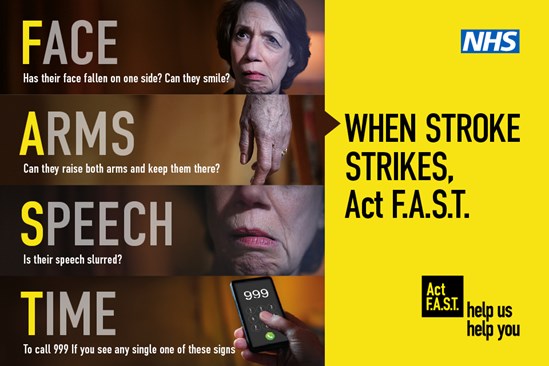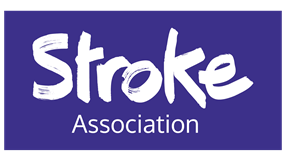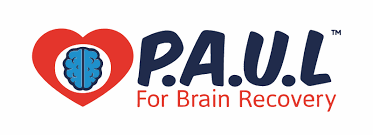Stroke
- Home
- Information and advice
- Health and wellbeing
- Health conditions
About Stroke
A stroke is a serious medical emergency that occurs when the blood supply to part of the brain is cut off. Quick treatment is crucial to minimise damage. If you suspect a stroke, call 999 immediately and request an ambulance.
Symptoms of a Stroke
The main symptoms of stroke can be remembered with the word FAST:
- Face – the face may have dropped on 1 side, the person may not be able to smile, or their mouth or eye may have dropped.
- Arms – the person with suspected stroke may not be able to lift both arms and keep them there because of weakness or numbness in 1 arm.
- Speech – their speech may be slurred or garbled, or the person may not be able to talk at all despite appearing to be awake; they may also have problems understanding what you're saying to them.
- Time – it's time to dial 999 immediately if you see any of these signs or symptoms.

Causes of a Stroke
The brain needs blood to get oxygen and nutrients. If blood flow is blocked or stops, brain cells start to die, which can cause brain damage, disability, or death.
There are two main types of strokes:
- Ischaemic stroke: Caused by a blood clot blocking blood flow, making up 85% of strokes.
- Haemorrhagic stroke: Caused by a burst blood vessel in the brain.
Certain conditions increase the risk of having a stroke, including:
- high blood pressure (hypertension)
- high cholesterol
- irregular heart beats (atrial fibrillation)
- diabetes
Caring for Someone who's had a Stroke
There are many ways you can provide support to someone after a stroke, this includes:
- Help with physiotherapy exercises: Assist them with their exercises between sessions.
- Provide emotional support: Reassure them that their condition will improve over time.
- Motivate them: Encourage them to reach their long-term goals.
- Adapt to their needs: Speak slowly if they have communication problems.
Be prepared for changes in behaviour. Stroke survivors may seem to have a different personality and act irrationally due to the psychological and cognitive impact of the stroke. They might become angry or resentful, but try not to take it personally. Remember, they often start to return to their old self as they recover.
Stay patient and positive. Rehabilitation can be slow and frustrating, but praising any progress, no matter how small, can help motivate them.
Don't forget to take care of yourself. Make time for socialising and leisure activities to maintain your own wellbeing.
For more detailed information, Different Strokes offers a useful document covering understanding stroke, its emotional and physical impact, caregiving tips, support and resources, and long-term care.
Preventing Further Strokes
If you have had a stroke, your chances of having another one are significantly increased.
You'll usually require long-term treatment with medicines that improve the risk factors for your stroke.
For example:
- medicine – to help lower your high blood pressure
- anticoagulants or antiplatelets – to reduce your risk of blood clots
- statins – to lower your cholesterol levels
You'll also be encouraged to make lifestyle changes to improve your general health and lower your stroke risk, such as:
- eating a healthy diet
- exercising regularly
- stopping smoking if you smoke
- drinking alcohol within the recommended limits
Effects of a Stroke
The stroke association has some great information of some of the effects of a stroke, these include:
- Physical: muscle weakness, swallowing problems, balance
- Communication and aphasia: aphasia is a language disorder that affects your ability to speak and understand what to say
- Emotional and behavioural
- Cognitive: memory and thinking, spatial neglect, vascular dementia
- Vision
- Behavioural changes

Useful contacts and information
Stroke Association

P.A.U.L For Brain Recovery

Paul for Brain Recovery website
Different Strokes

NHS Stroke Information

